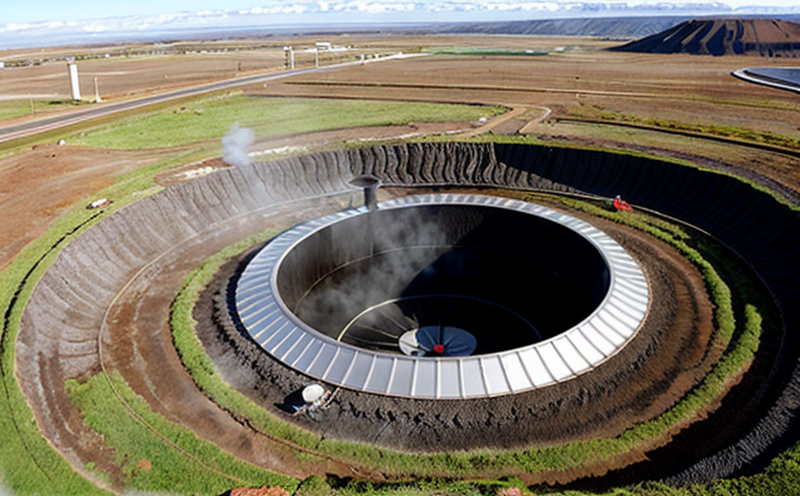ASTM D1298 Density Testing of Geothermal Brines
The ASTM D1298 density testing method is a cornerstone in the field of geothermal energy system testing, providing critical insights into the properties of geothermal brines. This test is pivotal for understanding and optimizing the performance of geothermal systems by ensuring that the brine meets specific quality standards necessary for efficient heat exchange processes.
The significance of ASTM D1298 density testing lies in its ability to assess various parameters such as density, viscosity, and salinity levels within the brine. These factors are crucial because they directly impact the efficiency of geothermal heat pumps, power generation units, and fluid circulation systems. By accurately measuring these properties, we can ensure that the system operates at optimal conditions, thereby enhancing its overall performance and longevity.
The testing process typically involves collecting representative samples from the geothermal source or reservoir under controlled conditions to prevent contamination. The sample is then prepared for analysis according to ASTM D1298 specifications, which include precise temperature control and handling procedures to ensure accurate readings. Once prepared, the brine sample is subjected to a series of tests using advanced instrumentation designed specifically for this purpose.
One key aspect of ASTM D1298 density testing is its role in detecting anomalies within the geothermal brine. Anomalies such as unexpected salinity spikes or changes in viscosity can indicate potential issues with the reservoir or contamination from external sources. Early detection of these problems allows for timely intervention, preventing costly downtime and ensuring continued reliability of the geothermal system.
Another important benefit of this testing method is its contribution to sustainability efforts within the energy sector. By optimizing brine properties through regular density testing, facilities can reduce waste generation and minimize environmental impact associated with improper fluid management practices. Additionally, accurate density data helps in designing more efficient heat exchangers and pumps, leading to reduced operational costs over time.
In summary, ASTM D1298 density testing serves as an essential tool for maintaining the integrity and efficiency of geothermal energy systems. Through precise measurement and analysis of brine properties, this test enables facility operators to make informed decisions that enhance system performance while promoting sustainable practices.
Scope and Methodology
| Test Step | Description |
|---|---|
| Sample Collection | Representative samples are collected from the geothermal source or reservoir. |
| Preparation | The sample is prepared according to ASTM D1298 specifications, including temperature control and handling procedures. |
| Density Measurement | The brine sample undergoes density measurement using advanced instrumentation. |
| Data Analysis | Results are analyzed to determine compliance with specified standards. |
| Equipment Used | Purpose |
|---|---|
| Density Meter | To measure the density of the brine sample accurately. |
| Air Bath Oven | To maintain precise temperature control during sample preparation. |
| Sampling Vials | For safe and accurate storage and transportation of samples. |
The ASTM D1298 density testing method is comprehensive, ensuring that all critical parameters are accounted for in the evaluation process. This ensures that the results obtained are reliable and can be relied upon for decision-making purposes.
International Acceptance and Recognition
The ASTM D1298 density testing method is widely recognized and accepted globally within the energy sector, particularly in regions where geothermal resources play a significant role. Its international acceptance is due to its alignment with ISO standards for environmental management systems, which emphasize the importance of accurate monitoring and control of fluid properties in resource-extraction processes.
Many countries have adopted ASTM D1298 as part of their national testing protocols for geothermal energy projects. This recognition underscores the method's reliability and effectiveness in providing consistent and repeatable results across different locations and conditions. The use of internationally recognized standards like ASTM D1298 helps ensure that all parties involved in geothermal project development are working towards common benchmarks.
The acceptance of this testing method also extends to regulatory bodies responsible for overseeing environmental impacts associated with resource extraction activities. By adhering to ASTM D1298, these organizations can verify compliance with local regulations while promoting best practices in sustainable resource management.
In conclusion, the international recognition and acceptance of ASTM D1298 density testing reflect its importance as a global standard for evaluating geothermal brine properties. Its widespread use across various industries demonstrates the confidence placed in this method by professionals worldwide who understand its value in maintaining high standards of quality control.
Environmental and Sustainability Contributions
The ASTM D1298 density testing method plays a crucial role in promoting environmental sustainability within the geothermal energy sector. By accurately measuring key parameters such as density, viscosity, and salinity levels of geothermal brines, this test helps ensure that these fluids are managed responsibly throughout their lifecycle.
One significant contribution of ASTM D1298 lies in its ability to detect anomalies early on, which can prevent unintended environmental impacts. For instance, if a sudden spike in salinity is detected during testing, immediate action can be taken to address the issue before it escalates into larger problems that could harm local ecosystems or infrastructure.
Furthermore, by optimizing brine properties through regular density testing, facilities can significantly reduce waste generation and minimize environmental footprints associated with improper fluid management practices. Efficient use of geothermal fluids not only conserves resources but also reduces carbon emissions from alternative heating methods.
The precision provided by ASTM D1298 also aids in designing more efficient heat exchangers and pumps, leading to reduced operational costs over time. These cost savings can be reinvested into further improvements in energy efficiency and sustainability initiatives, creating a positive feedback loop that benefits both the environment and business operations.
In summary, ASTM D1298 density testing contributes significantly to environmental protection by enabling proactive measures against potential risks while fostering responsible resource stewardship. Its role in enhancing operational efficiencies supports broader goals of sustainable development within the geothermal energy sector.





